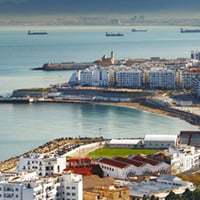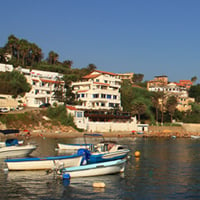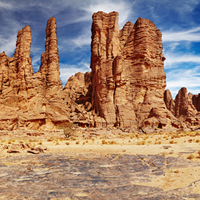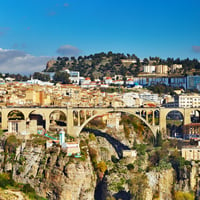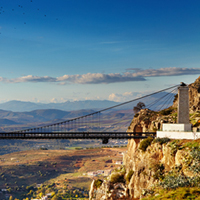Algeria
Coastal BeachesAlgeria, officially known as the People's Democratic Republic of Algeria, is a country in North Africa on the Mediterranean coast. It is the tenth-largest country in the world and the largest in Africa and the Arab world. The capital and most populous city is Algiers, located in the far north of the country on the Mediterranean coast. With a population of over 40 million people, Algeria has a diverse society, with Arabic and Berber as the official languages and French also widely spoken. The country has a semi-presidential republic form of government with the president as the head of state and the prime minister as the head of government. Algeria's landscape is varied and striking, with the Sahara Desert covering more than four-fifths of its territory. It is known for its rich history and has been home to many empires and dynasties, including the ancient Numidians, Phoenicians, Carthaginians, Romans, Vandals, Byzantines, Arab Umayyads, and the Berber Almohads and Hafsids. The northern part of the country is part of the Maghreb region and includes the Tell Atlas and Saharan Atlas mountain ranges, which run close to the coast and are part of the larger Atlas mountain system. The Hoggar Mountains and the Tassili n'Ajjer are located in the central Sahara in the south of the country. Algeria's economy is heavily reliant on hydrocarbons, and the country is one of the largest oil producers in Africa. The government has, however, been working on diversifying the economy by investing in the agricultural and industrial sectors. The country has a rich cultural heritage, with influences from various civilizations that have inhabited the region throughout history. This is reflected in Algeria's architecture, music, literature, and cuisine. The country has also been a key player in regional and international affairs, being a member of the United Nations, the Arab League, the African Union, OPEC, and the Non-Aligned Movement. Algeria played a significant role in the fight for decolonization in Africa and has continued to be an advocate for the rights of the Palestinian people. Despite its wealth in natural resources, Algeria faces several social and economic challenges, including unemployment and the need for political and economic reforms. The country has also experienced periods of civil unrest, most notably during the Algerian Civil War in the 1990s. More recently, the Hirak protest movement that began in 2019 has called for comprehensive political change and greater economic opportunities. Algeria's landscape offers a variety of activities for tourists, from trekking in the Atlas Mountains to exploring the vast expanse of the Sahara. The country's long history is showcased in numerous archaeological sites, such as the Roman ruins at Timgad and Djémila. The Mediterranean coast provides opportunities for beach tourism, with resorts and picturesque coastal towns. Algeria's cultural festivals, such as the Festival of the Desert, also attract visitors interested in the music and traditions of the region.
 GeoBlue
GeoBlueGet Quote
GeoBlue is a trusted leader in international health insurance. Wherever your destination, GeoBlue can keep you and your family covered with the right health insurance. Get a GeoBlue Quote Today!
 GeoBlue
GeoBlueGeoBlue is a trusted leader in international health insurance. Wherever your destination, GeoBlue can keep you and your family covered with the right health insurance. Get a GeoBlue Quote Today!
Get Quote
Living in Algeria
Visa & Residency
Obtaining a residency in Algeria involves several steps and can be somewhat challenging due to the bureaucratic processes. The most common types of residency visas for expats are the work visa and the family reunification visa. To apply for a work visa, an expat must first secure a job offer or a work contract from an Algerian employer. The employer must then obtain an authorization from the Ministry of Labor. The expat can then apply for a visa at the Algerian consulate in their home country, providing the necessary documents, including the work authorization, a passport valid for at least six months, application forms, photos, and a medical certificate. For family reunification, the process is similar, but the applicant must prove their family ties with an Algerian resident, such as a marriage certificate for a spouse or birth certificates for children. The process can be time-consuming and requires patience, as it involves multiple government agencies. The difficulty level is considered average, but it can vary based on individual circumstances and the efficiency of the Algerian bureaucracy at the time of application. It is important to note that all documents must be translated into Arabic or French and certified. Once in Algeria, expats must apply for a residency permit, which involves a separate application process and additional documentation. This permit must be renewed periodically. For digital nomads, Algeria does not offer a specific visa category. However, they may enter the country on a tourist visa or a temporary work visa if they intend to work remotely for a short period, usually up to 90 days. It is important for digital nomads to ensure they comply with Algerian laws regarding work and residency, as working on a tourist visa may not be legally permitted.
Healthcare in Algeria
The system in Algeria is a mix of public and private healthcare services. The public healthcare system is funded by the government and provides services to citizens at low or no cost. However, the quality of public healthcare can vary significantly, with urban areas typically having better facilities and more resources than rural areas. Private healthcare in Algeria offers higher quality services with more modern facilities and shorter waiting times, but at a higher cost. Expats and digital nomads can access public healthcare once they have a residence permit and are contributing to the social security system, although many opt for private health insurance to ensure access to private healthcare services.
Cost of Living
The cost of living in Algeria is considered moderate when compared to other countries. Prices for goods and services can vary, with urban areas typically being more expensive than rural areas.
Weather
Algeria's climate is predominantly dry, with the majority of the country experiencing arid to semi-arid conditions. The coastal region has a Mediterranean climate with mild, wet winters and hot, dry summers. Inland areas, particularly in the Sahara desert, can have extreme temperature variations, with scorching hot days and chilly nights. The northern mountainous regions receive more rainfall and can have cooler temperatures.
Educational System in Algeria
The educational system in Algeria is structured similarly to the French model, as Algeria was a French colony until 1962. Education in Algeria is mandatory and free for children between the ages of six and 16. The system is divided into three stages: primary education (enseignement primaire), middle school education (enseignement moyen), and secondary education (enseignement secondaire). Primary education lasts for five years, and upon completion, students receive a Certificate of Primary Education. Middle school also spans four years, culminating in the award of the Brevet d'Enseignement Moyen (BEM), which is necessary to enter secondary education. Secondary education lasts for three years, and students specialize in either general education or technical streams. At the end of this stage, students sit for the Baccalauréat exam, which determines their eligibility for higher education. The school year in Algeria typically starts in September and ends in June, with the main holidays in winter and spring, as well as an extended summer break. The quality of education varies, with urban schools generally better equipped and staffed than those in rural areas. The government has been working on improving the educational system by investing in infrastructure, teacher training, and curriculum development
Copyright 1997-2025 Burlingame Interactive, Inc.

